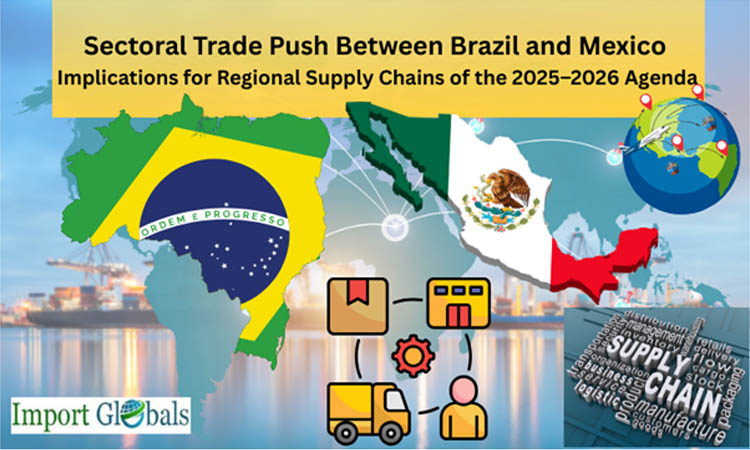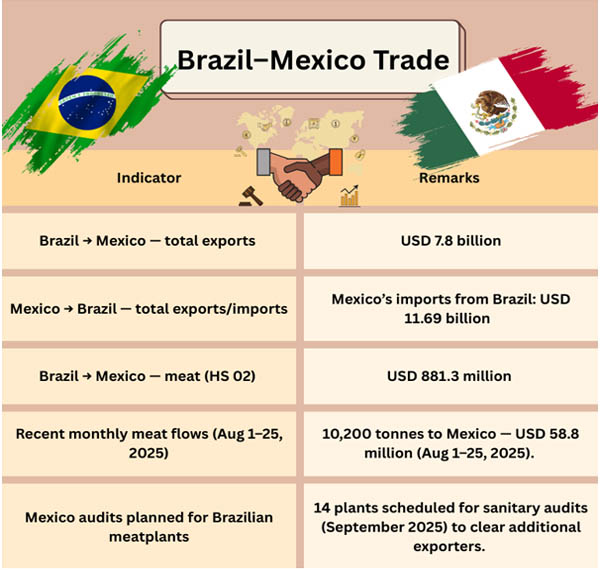
- Sep 29, 2025
Sectoral Trade Push Between Brazil and Mexico: Implications for Regional Supply Chains of the 2025–2026 Agenda
The two biggest economies in Latin America, Brazil and Mexico, are transitioning from rhetoric to practical, industry-focused collaboration.
A set of complementary, sectoral trade agreements will be formalized by August 2026, according to plans confirmed by Brazilian and Mexican officials following high-level meetings in August 2025. As per Brazil Import Data by Import Globals, these agreements will focus on modernizing bilateral rules and expanding market access in sectors like agriculture, health, biofuels, and energy, and emerging industrial value chains like electric-vehicle (EV) battery components. This plan demonstrates a realistic approach: both capitals favor specific, useful agreements over a single, comprehensive free-trade agreement that would need ratification at the bloc level.
Why not a comprehensive free trade agreement?
For the time being, Mexico has openly rejected a comprehensive free-trade agreement with Brazil, preferring partnerships that modernize sanitary and regulatory standards and reduce real trade barriers where benefits to both parties are most obvious. Based on Mexico Export Data by Import Globals, Mexico's integrated market with the United States and Canada is different from its political and economic calculation, and any comprehensive free-trade strategy for Brazil would also require Mercosur participation. By negotiating in sectors such as agriculture, health, biofuels, automotive/EV inputs, and focused industrial collaboration, both capitals may swiftly achieve measurable economic gains without having to deal with the burdensome political burden of a broad free trade agreement.
What is being discussed?
Meat and Agriculture: As the largest supplier of meat worldwide, Brazil has been stepping up its attempts to accredit additional meatpacking facilities for entry into Mexico. As per Brazil Import Export Trade Data by Import Globals, expanding exports, particularly following changes in global demand patterns, requires Mexican sanitary audits of Brazilian frigoríficos and a regionalization approach to animal-health regulations. Opening new factories and expediting sanitary permits will be a top priority because of the recent spike in Brazilian meat supplies to Mexico, while other markets experience tariff difficulties.
Energy Cooperation and Biofuels: Mexico Import Custom Data by Import Globals states that Brazil is looking at technology transfer and cooperation on sustainable aviation fuel and ethanol expansion, while Mexico has expressed interest in Brazilian biofuel blending regulations and sugarcane ethanol knowledge. This industry is appealing because it connects industrial cooperation, decarbonization objectives, and energy security.
Health and Hygiene Regulations: Shipment delays and compliance costs can be decreased by harmonizing sanitary and phytosanitary (SPS) regulations, coordinating regional surveillance (for example, avian influenza), and ensuring regulatory compatibility for medicines and medical equipment.
Collaboration between Industry and the EV Supply Chain: Opportunities in the manufacturing of batteries and their components for electric vehicles have been discussed. As per Mexico Import Trade Analysis by Import Globals, Brazilian companies are already present in Mexico's manufacturing sector, and the hemisphere's North-South value chains might be extended through focused industrial collaboration (joint ventures, knowledge transfer, and standards alignment).
Aerospace & Defense Procurement: There is exploratory interest in commercial ties such as sales of Embraer aircraft and joint maintenance/production support, a reminder that sector deals can include strategic manufactured goods, not just commodities.

How might trade flows be altered by the agreements?
Short term (next 6–12 months)
Faster meat growth to Mexico: As seen by Mexico Export Data from mid-2025, meat shipments to Mexico are expected to continue increasing with more plant permits and sanitary regulations. Losses in other markets with tariffs or access restrictions may be somewhat compensated for by this.
Pilots for Biofuel Cooperation: Instead of making big expenditures right once, expect pilot initiatives and technical exchanges (ethanol mixing, lab testing, SAF trials).
Period of time: medium (12–36 months)
Value-chain Deepening: To serve both domestic and NAFTA-adjacent markets, Brazil Import Data by Import Globals suggests that joint ventures and localized production may be used for EV battery parts, automotive components, and advanced manufacturing services.
Regulatory alignment: Especially for perishable agricultural and meat goods, standardized SPS and health procedures will cut down on border delays and compliance expenses.
Extended duration (3–5 years)
Diversification and Resilience: USA Import Trade Statistics by Import Globals indicates that a network of sectoral agreements could strengthen Latin American supply chains against extra-regional trade shocks (like tariffs). It could also reposition Mexico and Brazil as complementary hubs, with Mexico serving as a manufacturing and nearshoring hub to North America and Brazil as an agri-energy hub.
Hazards and Areas of Contention
Mercosur Politics: Brazil Import Shipment Data states that Brazil can negotiate sector agreements bilaterally, but any further market openness that impacts Mercosur tariffs or preferences will need bloc cooperation, which is a political roadblock.
Non-Tariff Obstacles and Standards: It is politically and technically difficult to harmonize standards; disputes over environmental protections, animal health procedures, and traceability may cause implementation to lag.
Third-Party Tariffs and Geopolitics: External shocks, such as U.S. tariffs or shifts in Chinese demand, can alter incentives and produce winners and losers inside businesses.
Domestic Politics: Regional governments, industrial unions, and agricultural lobbies in both nations may advocate for changes or safeguards that impede cross-border liberalization.
What Companies Ought to keep an Eye on Next?
Results of a Sanitary Audit (September 2025): The quantities of the meat trade in the near future will be directly impacted by the list of authorized Brazilian meatpacking facilities to export to Mexico.
Biofuels Technical Memoranda: Mexico Import Export Trade Analysis finds that Early signs of more extensive energy cooperation include any signed MOUs on the transfer of SAF or ethanol technology.
Announcements of Industrial Investment: Joint ventures in automotive parts, battery cells, or EV components will indicate a move away from raw material commerce and toward integrated production.
Conclusion
A practical change in Latin American economic diplomacy may be seen in the sectoral trade agreements between Brazil and Mexico. Instead of waiting for a politically complicated full-fledged free trade agreement, both countries are focusing on high-value industries like agriculture, biofuels, health standards, and industrial supply chains like EV batteries, where quick collaboration may provide benefits. The agreements offer Brazil more market access for its energy and agriculture know-how, which are highly competitive worldwide. They present Mexico with chances to increase its manufacturing hub status in North America, diversify its suppliers, and fortify its energy and manufacturing inputs. Import Globals is a leading data provider of USA import export trade data. Subscribe to Import Globals to get more details on global trade!
FAQs
Q1: Will these sectoral deals mean tariff elimination across the board?
Ans. No, the current approach is to negotiate targeted, complementary agreements (regulatory alignment, sanitary approvals, mutual recognition) rather than blanket tariff elimination. A full FTA would require broader approvals, especially from Mercosur.
Q2: Is meat the single biggest winner from these talks?
Ans. Meat is a clear short-term beneficiary (larger shipments and more plant approvals), but biofuels, health products, and industrial inputs (EV battery components) are also high-value opportunities.
Q3: Could Mexico re-export Brazilian products to the U.S. to evade U.S. tariffs?
Ans. Mexican officials have denied intentions to act as a tariff-evasion conduit; moreover, re-export strategies would face regulatory and rules-of-origin constraints. Still, trade diversion and re-routing are plausible effects when major markets impose steep new tariffs.
Q4: What should companies in India/Europe/US watch about this agenda?
Ans. Multinational buyers and suppliers should monitor plant approvals, SPS harmonization, and any export-credit or investment incentives. Shifts in Brazil–Mexico flows can affect global supply availability and prices for meat, ethanol, and certain manufactured inputs.
Q5. Where can you obtain detailed Brazil Export Import Global Trade Data or Mexico Import Export Global Data?
Ans. Visit www.importglobals.com or email info@importglobals.com for more information on up-to-date data.
